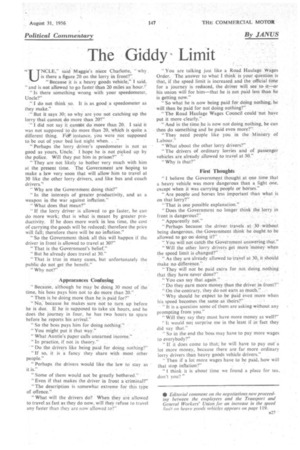Political Commentary
Page 61

If you've noticed an error in this article please click here to report it so we can fix it.
The Giddy Limit
By JANUS
" NCLE," said Maggie's niece Charlotte, "why , is there a figure 20 on the lorry in front?"
"Because it is a heavy goods vehicle," I said, " and is not allowed to go faster than 20 miles an hourY "Is there something wrong with your speedometer, Uncle?"
," I do not think so. It is as good a speedometer as they make."
But it says 30; so why are you not catching up the lorry that cannot do more than 20?" • " I did not say it cannOt do more than 20. 1 said it was not supposed to do more than 20, which is quite a different thing. Fof instance, you were not supposed to be out of your bed last night when. . ."
"Perhaps the lorry driver's speedometer is not as good as yours, Uncle. I hope he is not picked up by the police. Will they put him in prison?"
"They are not likely to bother very much with him at the present time. The Government are hoping to make a law very soon that will allow him to travel at 30 like the other lorry drivers, and like bus and coach d rivers."
"Why are the Government doing this?"
"In the interests of greater productivity, and as a weapon in the war against inflation."
"What does that mean?"
" If the lorry driver is allowed to go faster, he can do more work; that is what is meant by greater productivity. If he does more work in less time, the cost of carrying the goods will be reduced; therefore the price will fall; therefore there will be no inflation."
"So the Government think all this will happen if the driver in front is allowed to travel at 30?"
"That is the Government's belief."
"But he already does travel at 30."
"That is true in many cases, but unfortunately the public do not get the benefit."
" Why not?"
Appearances Confusing "Because, although he may be doing 30 most of the. time, his boss pays him not to do more than 20." . "Then is he doing more than he is paid for?"
"No,' because he makes sure not to turn up before he is due. If he is supposed to take six hours, and he does the journey in four, he has two hours to spare before he reports his arrival."
" So the boss pays him for doing nothing"
"You might put it that way." . "What Auntie's paper calls unearned income." "In practice, if not in theory." • "Do the drivers like being paid for doing nothing?" "If so, it is a fancy they share with most other people."
"Perhaps the drivers would like the law to stay as it is."
"Some of them would not be greatly bothered." "Even if that makes the driver in front a 'criminal?" "The description is somewhat extreme for this type of offence."
"What will the drivers do? When they are allowed to travel as fast as they do now, will they refuse to travel any faster than they are now allowed to?"
"You are talking just like a Road Haulage Wages Order. The answer to what I think is your question is that, if the speed limit is increased and the official time for a journey is reduced, the driver will see to it—or his union will for him—that he is not paid less than he is getting now."
So what he is now being paid for doing nothing, he will then be paid for not doing nothing?"
"The Road Haulage Wages Council could not have put it more clearly."
"And in the time he is now not doing nothing, he can then do something and be paid even more?"
"They need people like you in the Ministry of Labour."
"What about the other lorry drivers?"
"The drivers of ordinary lorries and of passenger vehicles are already allowed to travel at 30."
Why is that?"
First Thoughts
1 believe the Government thought at one time that a heavy vehicle was more dangerous than a light one, except when it was carrying people or horses."
"Are people and horses less important than what is on that lorry?".
"That is one possible explanation."
"Does the Government no longer think the lorry in front is dangerous?
"Apparently not."
"Perhaps because the driver travels at. 30 without being dangerous, theGovernment think he 'ought to be allowed to go on doing it?"
"You will not catch the Government answering that."Will the other lorry drivers get more 'money when the speed limit is changed?"
" As they are already allowed to travel at 30, it should make no difference."
"They will not be paid extra for not doing nothing that they have never done?"
"You can say that again."
" Do they earn more money than the driver in-front?" "On the contrary, they do not earn as much.",. "Why should he expect to be Paid evert more when his speed becomes the same.as theirs?" .
" It is a question some of them are asking without any prompting from you."
"Will they say they must have more money as well?" " It would not surprise me in the least if in fact they did say that."
"So in the end the boss may have to pay more wages to everybody?"
If it does conic to that; he will have to pay out' a lot more money, because there are far more ordinary lorry drivers than heavy goods vehicle drivers."
"Then if a lot more wages have to be paid, how will that stop inflation?"
"I think it is about time we found a place for tea, don't you? "




































































































